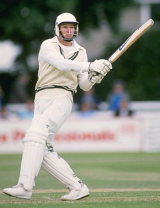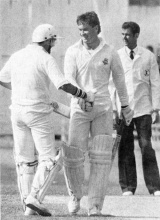Graeme Hick, born
in Zimbabwe, was
embarking on his
fourth full season
in English county
cricket. He was 21,
still three years
of residential
qualification away
from a Test debut
that was taken for
granted. In his first
three summers he
had scored 5,148
first-class runs at
56.57. And then he
went to Taunton...
Scorecard

|

Vic Marks: 'It was utterly mechanical
and I don't mean that dismissively.
He clinically scored 70 a session'
© Getty Images
|
|
At Old Trafford in April Graeme Hick
had made 212 in a 10-wicket victory.
The next best score in the match was
68. At Taunton, where he made 405
off 469 balls, it was 56. He became
the eighth man to score 1,000 runs
by the end of May and finished the
season with 2,713 runs at 77.51
Damian D'Oliveira (Worcestershire
batsman): I asked Graeme, "What's
it doing?" He replied: "Absolutely
nothing." Graham Rose bowled one
on off stump, it moved away and I
nicked it. "That's the only ball that's
done anything," he said. I told him
where to go.
Worcestershire were in trouble at 132
for 5 when Steve Rhodes joined Hick.
The wicketkeeper made 56 in a stand
of 265.
Vic Marks (Somerset spinner): The
Worcestershire innings was slowgoing
and the ball was doing a bit.
At 132 for 5 you were thinking, 300
all out at worst.
Hick: I just had a go at the ball if it
was in the right area and the
boundaries are fairly short at
Taunton.
Peter Roebuck (Somerset captain,
writing in Wisden 1989): One
mistake from Hick and they'd have
been all out for a poor score. He took
guard and began hitting the ball in
order to score runs. He did not say
much and yet he was neither distant
nor aloof. I never saw Walter
Hammond bat but I imagine he was
something like this - authoritative,
commanding, civil and durable.
Once or twice his leg shots were
lifted but they were hit with a power
that was efficient rather than savage
and they thundered through or over
the field.
Neil Burns (Somerset
wicketkeeper): They were the
longest two days of my life but I
had the best seat in the house and I
didn't have to pay for it. It was like
two games were going on. The ball
was nipping about and people
were nicking it in one but he was
batting immaculately and hitting
everything for four in the other.
Anything just a little too full he
drove straight, anything too
straight he clipped through the
leg-side clinically. He sits back for a
period of time but then sits on
bowlers in a way they can't come
back from. It was exceptional.
Marks: It was utterly mechanical
and I don't mean that dismissively.
He clinically scored 70 a session.
He was more orthodox than Kevin
Pietersen. If you bowled a goodlength
ball he would play it back
respectfully, although he was
clinical on anything off-line. There
were few big shots and he didn't
take too many liberties until the
late 200s. He popped me over midon
a couple of times, so I put a
long-on back. Then he would pop it
down there for one. This was
before he was tarnished by Test
cricket and I was acknowledging
he was in charge, cutting my losses
and trying to get the other
batsmen out, but they were giving
him amazingly obdurate support.
 They were the longest two days of my life but I had the best seat in the house and I didn't have to pay for it. It was like two games were going on
They were the longest two days of my life but I had the best seat in the house and I didn't have to pay for it. It was like two games were going on
 Neil Burns
Neil Burns
|
Steve Rhodes (Worcestershire
wicketkeeper): It was a marvellous
innings. He puts the bad ball away
more efficiently than anyone. I just
tried to blunt the attack. It was a
pleasure to run his runs for him. I
played only one shot in anger and
it got me out.
Phil Neale (Worcestershire
captain): Taunton suited Graeme
because straight-hitting is his forte
but he didn't seem to be blasting it.
It was sensible batting.
Hick was dropped in the gully on 148
- then there were no more chances
until he went past 300. He reached
179 at stumps on the first day.
Rhodes: Hicky's not a big drinker
but a group of us went for a Chinese
meal and he had a pint of lager.
Peter Roebuck came in with Graham
Rose and joked the booze could
make him succumb early next day.
Neale: The overnight break at
halfway in his innings suited him
as he could start again refreshed.
Burns: He worked very hard to get
back in as there was still freshness in
the pitch; his batsmanship from 200
to 300 was exceptional and showed
what a magnificent player he is.
Roebuck: Watching him, you
cannot tell if he is on 10 or 210. He
simply carries on. His game is as
pure as a punched hole. It is this
that frightens bowlers.
Rhodes: He went from 288 to 300
with straight sixes off Colin
Dredge - phenomenal shots.
Hick: I asked Phil what the plan
was on day two and he just told me
to see how it went. Once I reached
300 I just kept on having a go. I was
pleased to pass Worcestershire's
record score [Glenn Turner's 311
v Warwickshire in 1982] but
I didn't know about Hanif
Mohammad's record of 499.
Neale: The game-plan was always
to get as many as we could, as fast
as we could. We were going to
declare earlier but I delayed it
until Graeme reached 300 - he
then got to 400 so quickly we still
had time to bowl on that second
evening. I think he always knew I'd
call it a day at 400. I was aware of
various records but the team
objective was always the most
important thing.
Burns: After Hick reached 300 we
had one or two guys carrying
niggles and one or two had been
over-bowled. He was looking to hit
everything for four and it was a bit
like a benefit match.
Marks: Reaching 300 gave him the
license to cut loose. The ball was
flying everywhere. Watching him
running between the wickets was
superb - not just for his runs but
scampering the third for his partner.
He was fit and utterly selfless.
D'Oliveira: He received great
support from Rhodes, Phil
Newport (27) and Richard
Illingworth (31 not out). It was
brilliant batting with Graeme.

|

Hick received excellent support from Richard Illingworth, here congratulating him on reaching 400
© Wisden Cricket Monthly
|
|
Marks: I knew Worcestershire
weren't particularly aware of
Archie MacLaren's record (his 424
for Lancashire at Taunton in
1895 was the then highest
Championship score). I rather
grumpily pointed out, "Someone
has got 400 here before you know."
It would have taken him next to no
time to reach 425, and the match
barely got to day four as it was ...
Neale: I was also skipper when
Glenn Turner scored 311 not out -
he didn't mind me declaring
because he had blisters!
Hick: Obviously I had more
technically difficult innings but it
was just great to have such a long
time at the crease; you don't
normally get that long.
Roebuck: He used a bat so broad
that bowlers felt as if they were
trying to knock down a tank with
a pea-shooter.
Neale: I followed the old adage to
chuck the ball to the man who had
also scored all the runs.
Hick removed Nigel Felton and
Richard Harden that evening and
took three in the match as
Worcestershire won by an innings.
Burns: It's very sad that the great
player he was becoming in the late
1980s didn't go on to dominate in
Tests. West Indies came hard at
him in 1991 and maybe that was a
difficult experience to come back
from. One irony was that we
played Worcestershire in the
return a few weeks later and he
scored 8 and 11.
Neale: That was obviously
Graeme's highest score in my time
at Worcestershire but it probably
wasn't his best innings. He was
dropped a few times. The best I
saw him bat was that 212 at Old
Trafford; Lancashire had prepared
a turner in April and Graeme was
the only batsman who hit the ball
in front of square.
Hick: At that stage it was my biggest
achievement. Maybe it still is.



